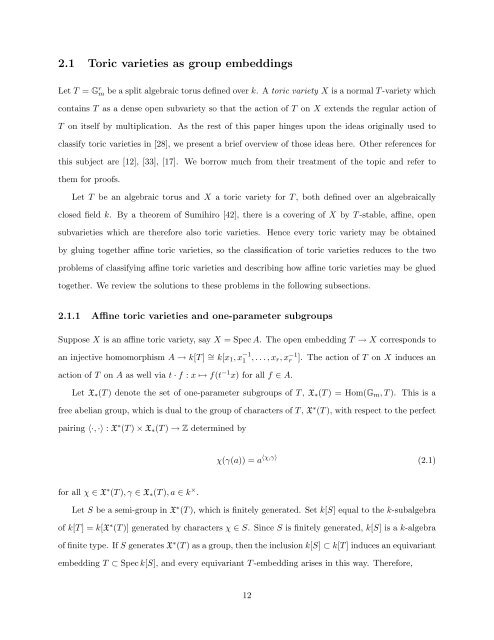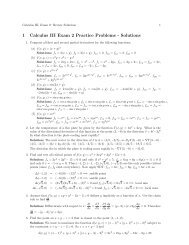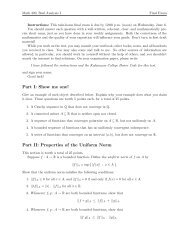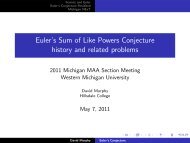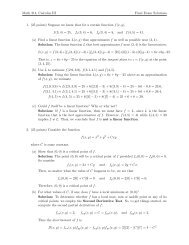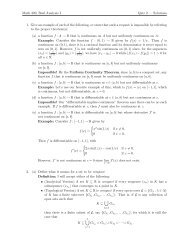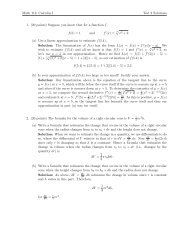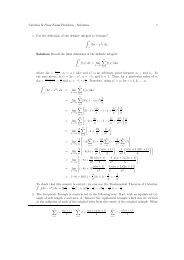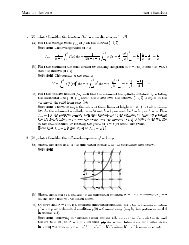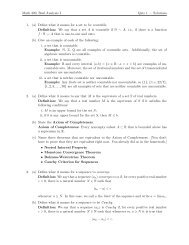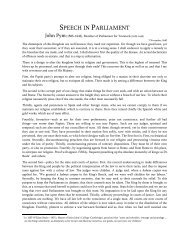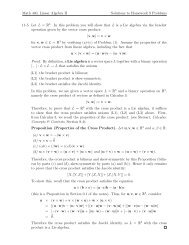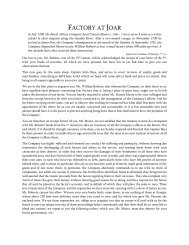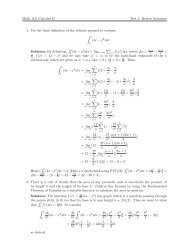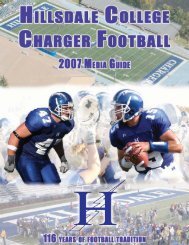Equivariant Embeddings of Algebraic Groups
Equivariant Embeddings of Algebraic Groups
Equivariant Embeddings of Algebraic Groups
Create successful ePaper yourself
Turn your PDF publications into a flip-book with our unique Google optimized e-Paper software.
2.1 Toric varieties as group embeddings<br />
Let T = G r m be a split algebraic torus defined over k. A toric variety X is a normal T -variety which<br />
contains T as a dense open subvariety so that the action <strong>of</strong> T on X extends the regular action <strong>of</strong><br />
T on itself by multiplication. As the rest <strong>of</strong> this paper hinges upon the ideas originally used to<br />
classify toric varieties in [28], we present a brief overview <strong>of</strong> those ideas here. Other references for<br />
this subject are [12], [33], [17]. We borrow much from their treatment <strong>of</strong> the topic and refer to<br />
them for pro<strong>of</strong>s.<br />
Let T be an algebraic torus and X a toric variety for T , both defined over an algebraically<br />
closed field k. By a theorem <strong>of</strong> Sumihiro [42], there is a covering <strong>of</strong> X by T -stable, affine, open<br />
subvarieties which are therefore also toric varieties.<br />
Hence every toric variety may be obtained<br />
by gluing together affine toric varieties, so the classification <strong>of</strong> toric varieties reduces to the two<br />
problems <strong>of</strong> classifying affine toric varieties and describing how affine toric varieties may be glued<br />
together. We review the solutions to these problems in the following subsections.<br />
2.1.1 Affine toric varieties and one-parameter subgroups<br />
Suppose X is an affine toric variety, say X = Spec A. The open embedding T → X corresponds to<br />
an injective homomorphism A → k[T ] ∼ = k[x 1 , x −1<br />
1 , . . . , x r, x −1<br />
r ]. The action <strong>of</strong> T on X induces an<br />
action <strong>of</strong> T on A as well via t · f : x ↦→ f(t −1 x) for all f ∈ A.<br />
Let X ∗ (T ) denote the set <strong>of</strong> one-parameter subgroups <strong>of</strong> T , X ∗ (T ) = Hom(G m , T ). This is a<br />
free abelian group, which is dual to the group <strong>of</strong> characters <strong>of</strong> T , X ∗ (T ), with respect to the perfect<br />
pairing 〈·, ·〉 : X ∗ (T ) × X ∗ (T ) → Z determined by<br />
χ(γ(a)) = a 〈χ,γ〉 (2.1)<br />
for all χ ∈ X ∗ (T ), γ ∈ X ∗ (T ), a ∈ k × .<br />
Let S be a semi-group in X ∗ (T ), which is finitely generated. Set k[S] equal to the k-subalgebra<br />
<strong>of</strong> k[T ] = k[X ∗ (T )] generated by characters χ ∈ S. Since S is finitely generated, k[S] is a k-algebra<br />
<strong>of</strong> finite type. If S generates X ∗ (T ) as a group, then the inclusion k[S] ⊂ k[T ] induces an equivariant<br />
embedding T ⊂ Spec k[S], and every equivariant T -embedding arises in this way. Therefore,<br />
12


